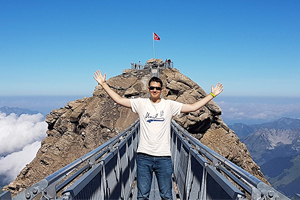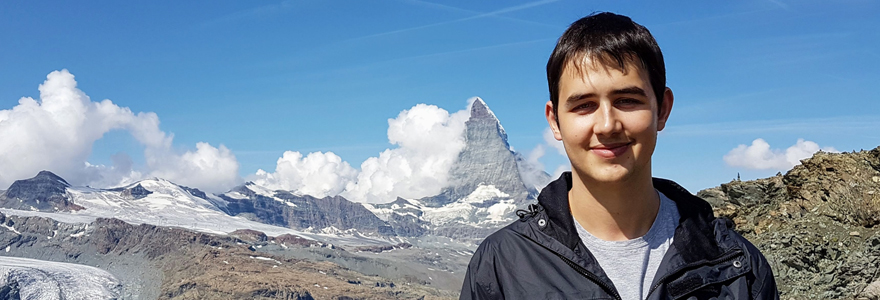Summer experiences inspire a future in research
By Emily Leighton, MA'13
Accustomed to problem-solving in a research lab, Mihai Dumbrava drew on his scientific training when he got lost on a 13-kilometre glacier trail in Switzerland last summer.
During an excursion to Glacier 3000, Dumbrava and seven of his fellow summer students lost their way on a steep hiking trail between Scex Rouge and Sanetsch. “We were admiring the views and taking pictures, and suddenly realized no one else was around,” he explained.
With a fresh snowfall covering most of the trail markings, the group had to guess their route to the closest cable car station, making it just in time for the final departure of the day.
 “What was supposed to be a five-hour hike turned into a full-day adventure we won’t ever forget,” said Dumbrava with a smile. “Through research, I’ve learned to think critically and to persevere when things don’t go as planned – lessons that definitely apply outside the lab as well.”
“What was supposed to be a five-hour hike turned into a full-day adventure we won’t ever forget,” said Dumbrava with a smile. “Through research, I’ve learned to think critically and to persevere when things don’t go as planned – lessons that definitely apply outside the lab as well.”
Dumbrava, a fourth-year Bachelor of Medical Sciences student at Schulich Medicine & Dentistry, spent three months in Switzerland through the Summer Undergraduate Research Programme at the University of Lausanne and a ThinkSwiss scholarship.
During his placement, he worked with researcher Vladimir Katanaev,
“It was fascinating to look at the underlying mechanisms of the disease and see the possibility for clinical outcomes down the road,” he said.
Equipped with new skills and plenty of travel stories from his experience in the Central European country, Dumbrava was recently invited to meet the Swiss Ambassador to the United States in Washington, D.C. He shared his experience with other ThinkSwiss scholarship recipients and explored the capital city.
As part of the Scholar’s Electives Program at Western, Dumbrava has been involved in basic science research throughout his undergraduate studies.
Supervised by Martin Duennwald, PhD, an associate professor in the Department of Pathology and Laboratory Medicine, he focused on familial Parkinson’s disease – investigating mutations in PARK7, a protein-coding gene, and determining how these mutations impair protein functions and interactions.
A recipient of NSERC Undergraduate Student Research Awards in 2016 and 2017, the motivated student was also able to spend two summers working in the Duennwald Lab.
“All of these experiences have shown me how exciting it is to be a researcher,” he said.
In addition to his scientific pursuits, Dumbrava is an active student leader on campus. He is helping organize the annual Western Student Research Conference, a multidisciplinary event taking place at on March 29 for undergraduate students from across Ontario. As the Conference’s Research Director, he helps select presenters, recruit judges and ensure participants walk away with new skills and connections.
“The Conference is a great opportunity to learn about many different areas of research and connect with students from a range of other disciplines,” he said.
As he nears graduation in June, the 22-year-old is hoping to continue his involvement in health research. “I’m interested in translational research and the clinician-scientist pathway,” he said. “Research and scientific discovery have the potential to help so many people.”



